You’re not hooked on junk food because you’re powerless.
Even though you’re an intelligent and capable human being, you’re hooked on these products because you have a normally functioning dopamine system that’s being deliberately hijacked by the processed food industry.
It may not be easy, and it does take time… but it is possible to take back control. Thousands have done it, and you definitely can too.
Why should you even care?
In an age of unprecedented medical advancements, too many people are dying in their 60s of preventable heart-disease or diabetes, or else spending their 70s and 80s with severe pain, immobility, and obesity (to say nothing of all the pills they’re taking).
Even chronic anxiety and depression can be caused by imbalances in the gut microbiome.
The good news is, you’re not doomed to these fates.
Many chronic & life-threatening conditions (diabetes, heart disease, arthritis, and even depression & anxiety) are reversible with a whole food plant-based lifestyle.
The popular documentary Forks Over Knives, along with heaps of other references have already made the case, and I’m not here to sell the science. Truth is, it doesn’t matter… Even if you just want to be a healthier omnivore, ultra-processed foods are a big problem.
How did we get here, anyway?
When Big Tobacco realized the jig was up, they needed a new hook.
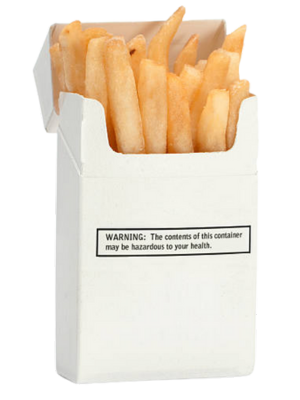
So from the 1980’s to the 2000’s, they purchased several major food manufacturers and brought in unscrupulous geniuses to deliberately make these products more biologically addictive and cheaper to manufacture using low-nutrient food by-products.
While they’ve “officially” divested these companies over the last 20 years, the genie was out of the bottle. The food system had been forever changed, and there’s no going back where profit is involved.
Fast forward to 2025 and our food system has become more toxic than ever. With fMRI imaging and modern lab techniques, these food scientists have gotten better and better at engineering foods designed to activate our dopamine-reward system and deliberately keep us hooked.
All of that is not your fault. You didn’t know… Just like a hundred years ago, people didn’t know about the dangers of smoking.
But now you do.
Now you know that the entire industry is intentionally and deliberately acting against the interests of its customers, in favour of ever-increasing profit margins.
Luckily, you don’t have to be powerless over food.
Junk Food Addiction is Unique
- No other addiction infiltrates so many aspects of our lives.
- No other substance is so universal or socially accepted.
- No other addiction requires us to keep doing the basic core behaviour, only drastically differently.
- No other addiction is so deeply imbedded in our most basic biology.
- No other substance has as much emotional baggage as both cause and cure of suffering.
- And no other addiction has as many onramps to get started and freeways to keep it going.
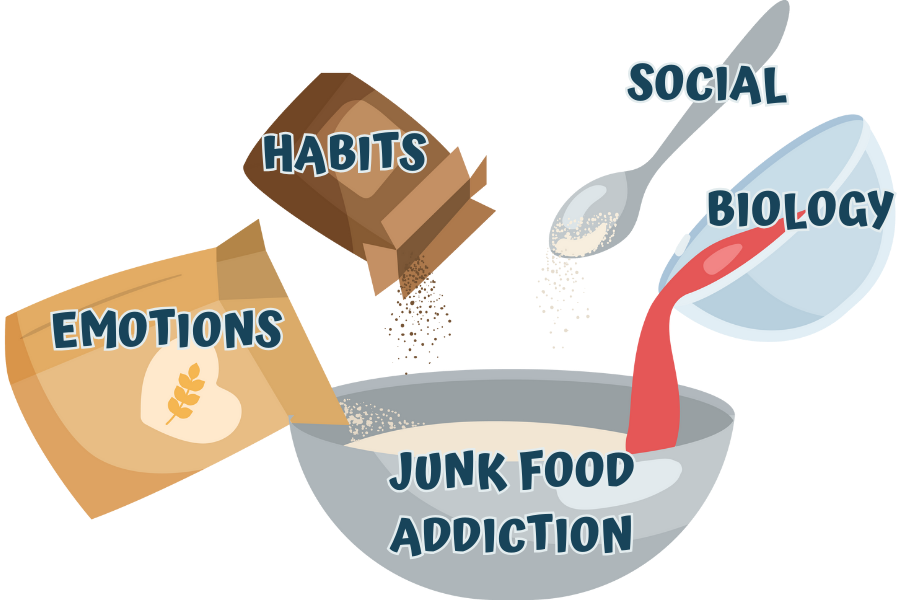
Junk Food Addiction is a multidimensional problem that needs a holistic solution.
This means working with all the domains of your addiction:
- emotional health
- biological dependency
- behavioural habits
- social system.
Your Origin Story Matters
If you started using junk food to soothe yourself in a chaotic childhood home, it’s different than if you started eating junk food just because that’s what you were fed at mealtimes.
That’s where most food addiction programs fall short — they treat everyone the same, regardless of how they got here. Either:
- it’s all about the food — change how you eat and the emotional pain will go away; or
- it’s all about the feelings — heal your core wounds and the cravings will take care of themselves.
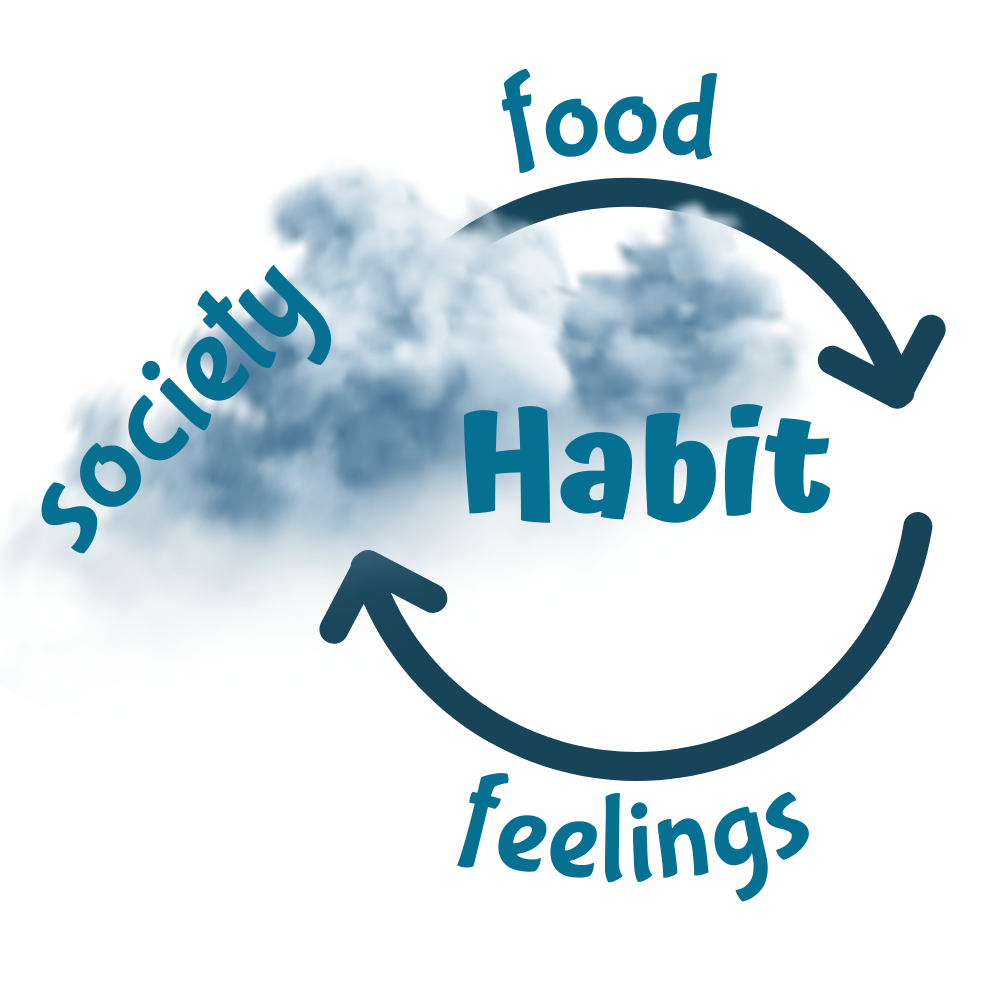
And all of them ignore that we’re living in a society where:
- a toxic food system is normalized
- fresh whole foods are getting less and less accessible, and
- junk food marketing is totally off the rails
So however you first got hooked on junk food, you’ll need to address all four domains of your addiction if you want to recover: emotions, habits, biology, and social.
You choose how you eat
Something in you already knows that.
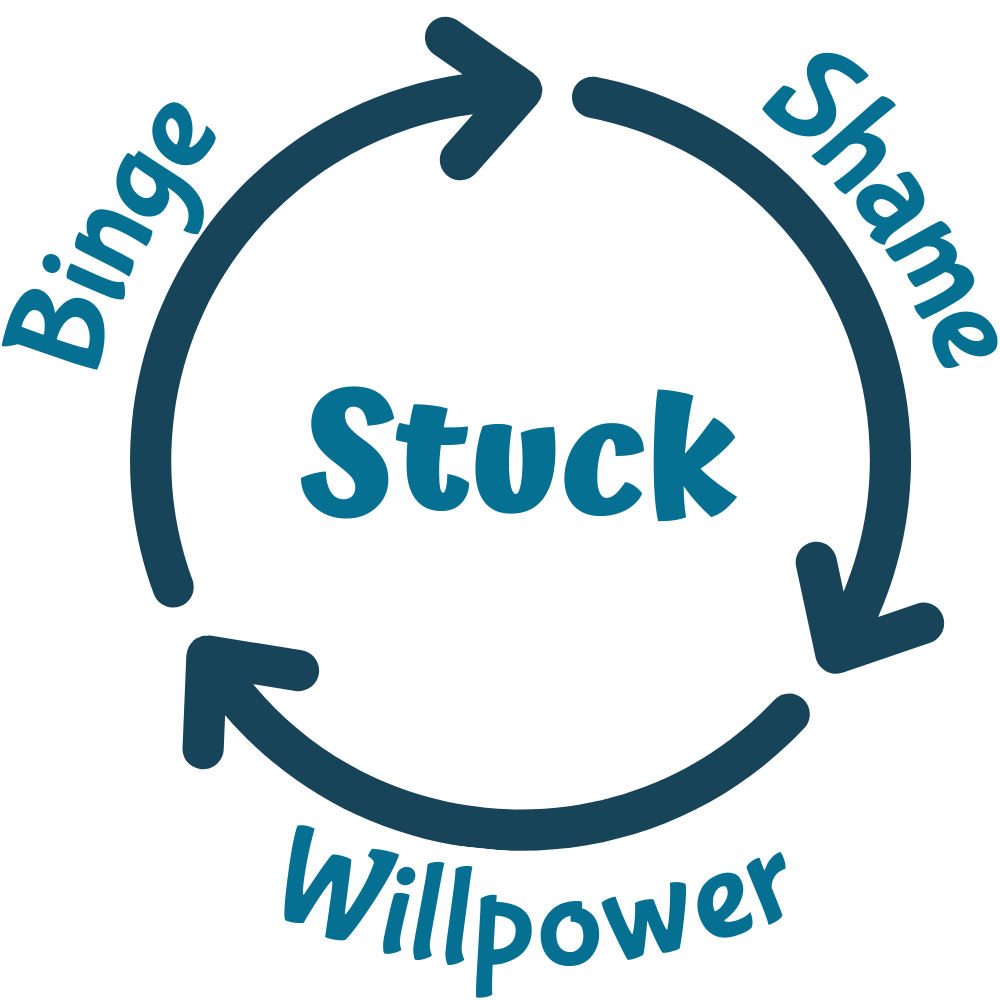
And that something is why you feel shame and guilt when you binge on piles of crap after you swore (for the umpteenth time) that today would be the day you start your new lifestyle.
So you double-down on your willpower because that’s all you know.
And maybe you do well for a while, eating healthy and staying away from sweets.
Then, feeling like you deserve a reward for your “good behaviour”, you decide to treat yourself.
Or, you have a really shitty day at work and you decide to soothe yourself with ice cream.
But what starts with one cheat day turns into nightly 7-Eleven runs for gummy bears and nachos.
Fuck. You failed again! You feel like shit.
Feeling shitty sucks, so you seek comfort and numbing with more chips, candy, and pizza.
And one day you find yourself stuck in this viscous cycle of emotion-driven binging, crippling shame, and white-knuckled restriction.
You’re not to blame!
You’re up against millions of years of evolution that’s being hijacked by a heartless industry with a billion-dollar war chest.
And real change is fucking hard.
That doesn’t mean you can’t make huge changes in your life. It just means you need to find the right point of leverage and the willingness to keep moving forward.
Empowerment isn’t about Willpower
Empowerment is about learning new tools & building more awareness about what’s happening inside your behaviour patterns:
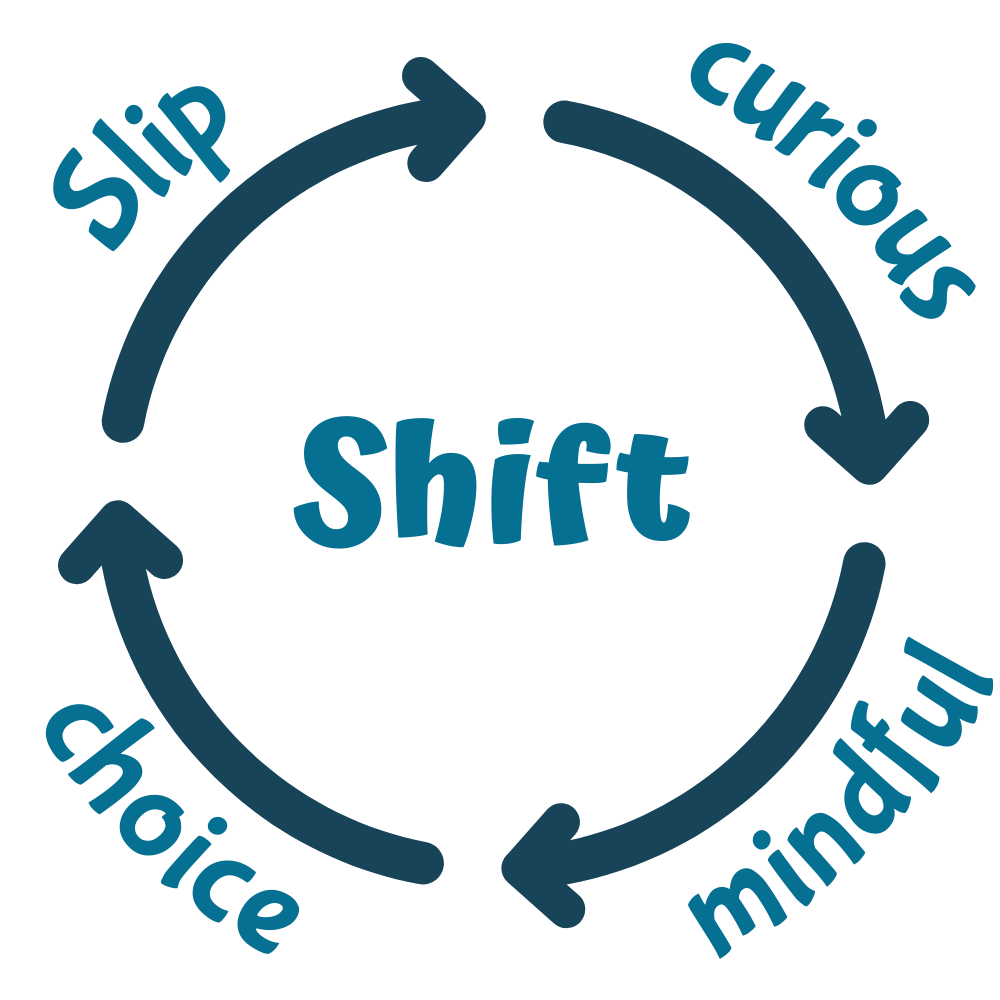
- Bring curious self-awareness to your strong feelings and eating behaviours
- to invite self-compassion.
- Practice mindful presence with your cravings and emotions
- to create a pause — a window where you can…
- Make new choices
- that add up and create new, healthier habits over time.
- Reframe binges as slips, and get back on the horse
- to lessen the shame and hopelessness.
How does working with me help?
My work is grounded in three core principles: presence, connection, and curiosity.
- Presence because everything we experience is always happening in the present; everything else is memory or fears. So tuning into the present-moment-experience is the only way to change what we’re doing.
- Connection because all wounds are relational wounds – either because the injury was directly caused by another person, or because no person was there for you when you needed them, and that’s the injury.
- Curiosity because no one ever knows exactly what another person needs in order to heal and grow; but when we bring our curiosity to what’s happening – in the moment and in connection – the next right thing emerges organically.
You’ve spent decades building your current eating habits, so they’re not going to change overnight.
That’s why I work with client weekly for a minimum of 3 months in a Deep Dive, giving you space to acquire the foundational tools and practices you need to address all four domains of your addiction:
- emotional health
- biological dependency
- behavioural habits
- social support system
To learn more about how I work, please visit What does working with me look like?
Here Be Dragons…
I tried to do this on my own for far too long, and I wish I’d gotten help sooner. My relapses were longer, more frequent, and more intense than they needed to be. I struggled alone — thinking I just needed to try harder.
I didn’t — I needed new tools and and I needed support.
If my approach isn’t the right fit or your finances are too tight, there are free programs out there. Twelve Steps (OA, FA, FAA, EDA) are always an option if you’re open to spirituality; SMART Recovery is more science-based if you’re not. Both have groups online or in-person. Either way, it’s important to find a group where you feel supported and comfortable. Make friends with people who seem to have their head on straight, and reach out for help when you need it.
You can do this!
